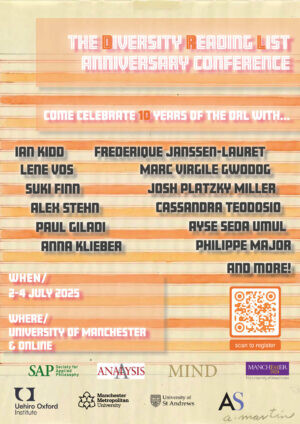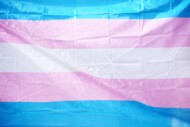Join us at the 10th Anniversary Conference!
Online participation possible, all in-person participants will be sent the online link as well.
DRL’s 10th Anniversary Conference
2 July – 4 July 2025, University of Manchester.
The year 2025 will mark the 10th anniversary of the Diversity Reading List’s existence, and we are happy to invite you to celebrate with us the various efforts and projects dedicated to making philosophy a discipline of equal opportunity.
Since 2015, the DRL has aimed to make philosophy more inclusive, diverse, and to promote equality of opportunity in our discipline. Racial and gender disparities in philosophy are significant, and if you are not a white cisgendered man, you are still likely to belong to a group which is significantly under-represented in contemporary Anglophone philosophy. But the landscape has been changing over the last decade and we are proud to have been a part of that change. It that time, the DRL aimed to address inequalities in representation by helping to overcome their cause: the stereotype of a philosopher as a white male. We continue to do so by making it easier for lecturers to find high quality texts written by authors from under-represented groups, by helping students set up reading groups on a diverse range of topics, and by popularising and conducting own original research into the state of the discipline.
At this two-and-a-half-day conference, we would like to celebrate the progress of the last decade and discuss what remains to be done; to bring together academics working on themes relevant to the DRL’s mission, and to make work by authors from under-represented groups more visible in university education and research.
Programme (interactive booklet here)
- Alex Stehn (Texas Rio Grande Valley): “Pluralizing Philosophical Languages and Cultures”
- Anna Klieber (Cardiff): “Silence under Oppression”
- Ayşe Seda Umul (Bilkent University): “Structural Gaslighting and Epistemic Oppression: The Marginalisation of Queer Identities in Patriarchal Societies”
- Cassandra Teodosio (Women Doing Philosophy, UP Diliman): “The Experience of Women Doing Philosophy in the Philippines: Voices and Writings from the Peripheries”
- Clotilde Torregrossa, Quentin Pharr, Simon Fokt (St Andrews/Berlin): “Categorising Philosophy in a new key”
- Frederique Janssen-Lauret (Manchester): “Susan Stebbing’s Arguments Against Metaphysical Determination”
- Ian Kidd (Nottingham): “Vices of Metaphilosophical Myopia”
- Josh Platzky Miller (Witwatersrand): “Legitimacy Debates, the myth of ‘Western Philosophy’, and the Contribution of Ben Kies”
- Lene Vos (Utrecht): “Gabrielle Suchon and Mary Astell on the authority, education and liberty of women”
- Marc Virgile Gwodog (Douala): “Zara Yaqob and Walda Heywat on Gender Equality: Does Sexual Pleasure Matter to Equality?”
- Paul Giladi (SOAS): “Being Epistemically Disobedient: Reflecting on Co-Creating the SOAS Decolonising Philosophy Toolkit and Handbook”
- Philippe Major (Lancaster): “Structural Eurocentrism in Philosophy: An Argument for Sociometaphilosophy”
- Suki Finn (Royal Holloway): “Gender and Reproduction in Philosophy”
Location and participation
University Place; Rooms 5.206 & 5.207; 176 Oxford Street, M13 9PL
The rooms are fully accessible. For more see access guide for room 5.206 & 5.207
The DRL Anniversary Conference is free to attend both in person and online. Register using the form provided.
For any questions, write to contact@diversityreadinglist.org
DRL adheres to the BPA/SWIP Good Practice Guide for Conferences.
Organised by
Joseph Bentley, Justina Berskyte, Maria Jimena Clavel Vazquez, Lucija Duda, Simon Fokt, Lisa Forsberg, Christopher Masterman, Clotilde Torregrossa
Patronage







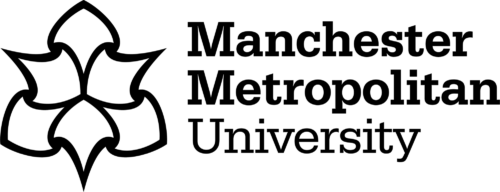
Subscribe to our Newsletter to be notified about future events!
Past events
-
Expand entry
-
An online reading group on Trans Philosophy organised by the MAP Taskforce for Gender Minorities, running during the summer of 2024. By the end, the group aims to create a Reading Group Blueprint on the topic.
Register & Join by midnight 29/05/2024
Programme
No items foundPatronage

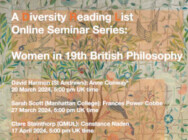
Women in Nineteenth Century Philosophy
27 March – 8 May 2024, Online event.
Organised by Alison Stone (Lancaster)
-
Expand entry
-
The seminar series on Women in Nineteenth Century Philosophy draws together scholarship rediscovering women philosophers from nineteenth-century Britain who have been unjustly left out of the philosophical canon. The talks introduce these women and their thinking on such topics as feminism, animals, metaphysics, religion, science and Darwinism.
Programme
David Harmon (St Andrews): Shape Is the Instrument of Life: Anne Conway and the Ontological Source of Figure (Postgraduate Session)20 March 2024, 5:00 pm UK time-
Expand entry
-
Session organised in collaboration with the British Postgraduate Philosophy Association.
Abstract
In her Principles, Anne Conway states that “shape is the instrument of life” and that “shape serves the operations of life” – a bold thesis about the relationship between her vitalism and her conception of figure. She is generally clear that creatures have figure, by which (I argue) she means that they are characterized by internal and external determinations on their extension which give them geometrical shape. However, there are some fascinating features of Conway’s conception of figure that follow from her commitments to vitalism, body-spirit monism, and creaturely impenetrability. In this paper, I offer an account of Conway’s conception of figure and argue that she inverts an agreeable mechanical thesis by injecting vitalism as a basic feature of her ontology. Conway holds that a creature’s shape is partially the result of its strongest spiritual parts affecting its bodily parts in accordance with the image or idea internal to the spiritual parts. In other words, Conway holds that a creature’s shape is to a great extent self-determined, according to a vital principle internal to that creature. Thus, Conway takes mechanical figure to be dependent on life; this is a surprising inversion of the widely-held Cartesian mechanistic view. Among philosophers like Descartes and Spinoza, explanations of the features of things in the natural world were held to be mechanical in nature. Thus, vital functions of living things were thought to be explainable as the results of mechanical features of bodies, like figure and motion. For Conway, however, it is figure that is explainable in terms of life, not the other way around.
Further, there is a question of the ultimate origin of figure in Conway’s system. God, who is explicitly conceived by Conway as having no figure whatsoever, is named as the ultimate source of figure in creatures. Given a plausible framework for understanding causation in Conway as a species of emanation, according to which causes and effects must be relevantly similar to one another, the source of figure in the system seems somewhat mysterious: how can God cause creaturely figure if God has no figure? I offer an account of figure in Conway that respects her commitments about emanative causality, divine simplicity, and creaturely impenetrability. This account has surprising implications for a recently popular debate in Conway scholarship about classifying her monism. If the account is right, then it provides some evidence that we should think of Conway as a priority monist with regard to creatures.
The aims of this paper are thus roughly threefold: (i) to explore and alleviate an apparent tension between Conway’s commitment to God’s being both figureless and the source of creaturely figure, (ii) to shed light on Conway’s metaphysics of figure as an innovative and highly original account, and (iii) to show that these considerations can help scholars to better understand Conway’s monism.
Biography
David Harmon is a PhD candidate at the University of St Andrews and the University of Stirling. His research is in metaphysics, mostly in the early modern period and with a particular focus on Spinoza and Conway, as well as other expansions on and responses to Cartesianism. Of special interest in his work is the interaction between metaphysics and physics in the 17th century. David also has research interests in contemporary metaphysics.
Sarah Scott (Manhattan College): Frances Power Cobbe27 March 2024, 5:00 pm UK time-
Expand entry
-
Abstract
In this talk I introduce the moral philosophy of Frances Power Cobbe (1822–1904). A prolific author, Cobbe was instrumental in the passage of the Matrimonial Causes Act (1878) and founded the Victoria Street Society (1875; still existing as the National Anti-Vivisection Society) and the British Union Against Vivisection (1898; still existing as Cruelty Free International). An interlocutor of John Stuart Mill and Charles Darwin, Cobbe used her original interpretation of Kantian “intuitive morality” to shift public opinion on domestic abuse, divorce law, women’s right to higher education, and animal welfare, challenging the narrative that utilitarians held a monopoly on these issues.
Biography
Dr. Sarah Scott is Professor and Chair of Philosophy at Manhattan College. She conducts research in ethics and the history of philosophy, particularly interdisciplinary or marginalized figures. Her first major project was on Martin Buber: she is the editor of Martin Buber: Creaturely Life and Social Form (Indiana University Press, 2022) and has published several studies of Buber’s ethics, aestheticism, and forgotten influences. Her second major project is on forgotten women philosophers, especially those that challenge current notions of philosophic genre.
Clare Stainthorp (Queen Mary University of London): Constance Naden17 April 2024, 5:00 pm UK time-
Expand entry
-
Abstract
Constance Naden (1858–1889) was a philosopher, poet, and student of science. While she most frequently appears on literature syllabi, there is an increasing body of scholarship concerned with her philosophical works. Certainly, her philosophical writings (underpinned by her scientific studies) and identity as a freethinker were the elements of her life’s work that she prioritized. While Naden initially propounded the theory of Hylo-Idealism – an idealist-materialist philosophy that rejected dualism – she became increasingly uneasy with dogmatic advocacy of a single creed and, influenced by Herbert Spencer’s Synthetic Philosophy and the radical secularist movement, came to write more broadly about ethics and the social nature of humanity. Her mature writings focused upon Cosmic Identity, a relational system that found unity in diversity and prioritized mutual understanding over individualism. This talk will introduce Naden’s ideas, outlining her cumulative philosophical practice through which she synthesized diverse knowledge to develop a secular theory of life and mind.
Biography
Clare Stainthorp is a Leverhulme Trust Early Career Fellow at Queen Mary University of London. Her research focuses on the nineteenth-century freethought movement and its periodicals. She is the author of Constance Naden: Scientist, Philosopher, Poet (2019) and co-editor (with Naomi Hetherington) of the Routledge resource volume Nineteenth-Century Religion, Literature and Society: Disbelief and New Beliefs (2020).
Emily Thomas (Durham University): Victoria Welby on the Nature of Reality24 April 2024, 5:00 pm UK time-
Expand entry
-
Abstract
Victoria Welby (1837–1912) began working on philosophy in 1880s Britain, a heady period which saw scientists and philosophers grappling with new theories of matter, evolution, and space. Building on the debates of her day, Welby produced her own metaphysic – an account of reality on which matter is really motion, and wherein everything is really spirit. This talk will explore reality a la Welby.
Biography
Emily Thomas is Professor in Philosophy at Durham University. Prior to this she obtained a PhD from the University of Cambridge, and held a NWO grant at the University of Groningen. She has published widely on the history of metaphysics, especially space and time. She is the author of several scholarly monographs, including Absolute Time: Rifts in Early Modern British Metaphysics (2018, Oxford University Press), and Victoria Welby (2023, Cambridge University Press); and the popular book The Meaning of Travel: Philosophers Abroad (Oxford University Press, 2020). In 2020 she won a Leverhulme Prize for excellence in research.
Sue Brown (Oxford and Toronto): Julia Wedgwood8 May 2024, 5:00 pm UK time-
Expand entry
-
Abstract
Julia Wedgwood (1833-1913) was a leading female Victorian non-fiction writer whose books and many articles covered an exceptionally wide range including biography, history, literary criticism, philosophy, theology and evolutionary sciences. She was also a campaigning feminist who knew many of the leading cultural figures of her age including Robert Browning, who she might have married, Thomas Carlyle, Elizabeth Gaskell, Harriet and James Martineau, George Eliot, Frances Power Cobbe, Victoria Welby and the young E. M. Forster as well as her aunt and uncle, Emma and Charles Darwin.
Sue Brown, who recently published the first biography of her (Julia Wedgwood, the Unexpected Victorian, Anthem Press 2022) will focus on her developing reactions to Darwin’s work. Her initial enthusiasm for On the Origin of Species continued with her interest in Darwin’s views on sexual selection in The Descent of Man but criticism of his destructive influence in a hostile review of his posthumous biography written by his son, Frank. Sue Brown will consider why Wedgwood’s views took this atypical course and how it meshed with her feminism and dialectical view of the course of world history.
Biography
Sue Brown reads history at Oxford and Toronto Universities specialising in nineteenth century Britain. She was a civil servant for thirty years including time in Brussels, Washington DC and as Head of Arts in what became the Department of Culture, Media and Sport. She has published biographies of Joseph Severn, the artist who went with the dying Keats to Rome, Paul Asciak, the Maltese operatic tenor and teacher, and Julia Wedgwood, as well as many articles on Gladstone, Severn, Browning, Julia Wedgwood, and Harriet Martineau.
Patronage


-
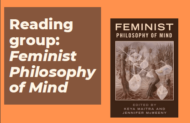
Feminist Philosophy of Mind
19 October – 5 April 2023, Fortnightly on Wed, 5pm UK time via Zoom.
Organised by Adriana Alcaraz-Sánchez and Jodie Russell
-
Expand entry
-
A reading group based on a book anthology under the same title, edited by Keya Maitra and Jennifer McWeeny.
Register & Join | Seminar schedule | See the book
Programme
No items foundPatronage


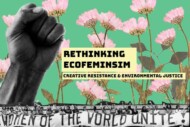
Creative Resistance and Environmental Justice: Rethinking Ecofeminism
19 October 2022, Online event.
Organised by Suddhasatwa Guharoy and Julia Costet
-
Expand entry
-
The seminar Creative Resistance & Feminist Ecologies aims to bring researchers and activists from diverse academic traditions and differently situated lifeworlds in order to discuss questions related to ecofeminist futures. For this seminar series, we are interested in ecofeminist theory and praxis, its interconnections with other critical approaches, its relevance and potential for informing creative resistance and the pursuit of environmental and intersectional justice.
Programme
Manisha Rao (University of Mumbai): Reimagining Resistance: Understanding Ecofeminism in Uttara Kannada District, Karnataka, India19 October 2022, 11:00 am UK time-
Expand entry
-
Abstract
The ecofeminist discourse in India and the Global South needs to be understood somewhat differently from its western counterpart that is rooted in ideology. Emphasis needs to be laid in the everyday experiences and material contexts of struggles of daily life in the Global South. The ecofeminist discourse needs to be analyzed in the context of the growing protests against environmental destruction and the privatization of the Commons. In this paper I propose to analyse the Appiko Chaluvali that took place in the early 1980s in the Uttara Kannada district of Karnataka, India. The movement emerged to protect the natural forests of the district on which the spice garden economy of the region depends. The creative resistance put up by the people of the region through Yakshaganas (traditional folk theatre of Karnataka), Bhavageethes (form of poetry set to music), posters and so on are analysed. Even at present times, the women of the region have tried to forge a sisterhood across lines of caste, class and ethnicity to come together to solve their problems and to take initiatives such as starting seed collectives, cultivating kitchen gardens and subverting the dominant betelnut economy. It is in this context that one would like to critically analyse the discourse on ecofeminism and see if there is a distinct Indian variant of ecofeminism.
Biography
Manisha Rao is an Associate Professor in the Department of Sociology at the University of Mumbai. An alumni of University of Pune, she is an expert in ecofeminist theory, gender theory, and women’s environmental movements in India. She is the author of several essays on these subjects, one influential paper being Theory and Practice of Ecofeminism in India. She was the editor of Reframing the Environment: Resources, Risk & Resistance in Neoliberal India, which was published by University of Mumbai Press in 2016. She has also undertaken research projects on related issues in various parts of India.
Christa Wichterich (University of Kassel): In Defense of Life and Livelihoods. Ecofeminist perspectives of analysis of and resistance against violence against bodies, territories and nature19 October 2022, 12:15 pm UK time-
Expand entry
-
Abstract
SARS Covid-19 has broken up the prevailing western narrative of the rule of reason in societies, and its domination over bodies and nature. It has exposed the crisis of society-nature relations which is apparent in the destructive paradigm of the growth-obsessed, resource-intensive and extractivist development model, its depletion of the care labour force, resources and ecosystems, and the vulnerability of bodies and societies. This contribution starts with a brief review of different types of ecofeminisms, of feminist political economy and feminist environmentalism; the main point of critique is the former essentialist feature of some ecofeminists. The input then embarks on a time- and space-diagnostic analysis of the current modernization of the neoliberal capitalist mode of production and social reproduction, and of the appropriation of land, livelihoods and diversity. Finally it explores strategies of resistance. Recent changes of ecofeminism build on a more intersectional analysis which links feminist ecology and feminist political economics, and gears towards an emancipatory socio-ecological transformation. Care work and care ethics are pivotal in theoretical and practical concepts towards breaking up the productivity- and profit-oriented rationale of resource use instead of conviviality of humans and nature. The care approach in the framework of ecofeminism has to be critical of power structures, dualisms and hierarchies in the society-nature relations and needs commoning and resistance for (re)claiming of spaces and territories. Analyse, politicise, resist, transform and beware of romanticism.
Biography
Christa Wichterich is a scholar-activist, a Professor at the University of Kassel. She is a sociologist specialised in gender politics, women’s movements and feminist ecology. She is the author of the influential books The Globalized Woman: Reports from a Future of Inequality and The Future We Want: A Feminist Perspective. She also works as a freelance publicist, author, and as a consultant in development cooperation. She spent several years in India and Iran working as a university lecturer and in Kenya as an Africa correspondent. She is actively involved in the Scientific Advisory Board of attac Germany and in the Europe-based network Women in Development Europe (WIDE+).
Lori Gruen (Wesleyan): Ecofeminism and Critical Animal Theory19 October 2022, 2:45 pm UK time-
Expand entry
-
Abstract
TBC
Biography
Lori Gruen is the William Griffin Professor of Philosophy at Wesleyan University. She is a leading scholar in animal studies and feminist philosophy. She is the author and editor of eleven books, including Ethics and Animals: An Introduction (Cambridge, 2011), The Ethics of Captivity (Oxford, 2014), and Entangled Empathy (Lantern, 2015) and the forthcoming Critical Terms for Animal Studies (2018). Most recently, she co-authored a book with Alice Crary entitled Animal Crisis: A New Critical Theory. She is a Fellow of the Hastings Center for Bioethics and a Faculty Fellow at Tufts’ Cummings School of Veterinary Medicine’s Center for Animals and Public Policy and was the first chair of the Faculty Advisory Committee of the Center for Prison Education at Wesleyan. Her research lies at the intersection of ethical theory, political philosophy, and social practice. She has written on a range of topics and her current projects include exploring ethical and political questions raised by captivity and carceral logics.
Nicole Seymour (California State University): Cis and Trans Ecologies: Genders for the Anthropocene19 October 2022, 4:15 pm UK time-
Expand entry
-
Abstract
We live in a time of renewed assaults on reproductive, transgender, and other human rights in the United States and elsewhere. But this is also a moment of possibility, when contemporary culturemakers are imagining new futures of cis-trans solidarity, cross-species sensitivity, and trans mutual aid. These imaginings respond to climate change and other environmental crises—thereby reminding us that these crises are driven in the first place by colonial cis-heteropatriarchy. My talk will focus on the work of three U.S. culturemakers: Latinx trans poet Oliver Baez Bendorf, white trans writer Callum Angus, and nonbinary Chinese-American artist Mary Maggic.
Biography
Nicole Seymour is Associate Professor of English at California State University, Fullerton, where she serves as the Graduate Advisor for the Environmental Studies Program. Her research in the environmental humanities asks how literature and other cultural forms – from documentary film to standup comedy – mediate our relationship to environmental crisis. She is the author of three monographs, Strange Natures: Futurity, Empathy, and the Queer Ecological Imagination (University of Illinois Press, 2013), Bad Environmentalism: Irony and Irreverence in the Ecological Age (University of Minnesota Press, 2018) and her most recent publication Glitter (Bloomsbury, 2022). She is also a curator for NXTerra, an open-access repository of climate pedagogy materials developed by faculty across the California State University and University of California systems. In addition to her fellowship project, Dr. Seymour is currently working on topics including queer ecologies, feminist plastic art, vegan satire, and contemporary Indigenous poetry.
Elaine Nogueira-Godsey (Methodist Theological School, Ohio): Rethinking Ecofeminism and Religion, A Decological Perspective19 October 2022, 5:30 pm UK time-
Expand entry
-
Abstract
This paper approaches the feminist backlash towards ecofeminism in the 1990s. Grounding their argument on the secular as the sphere of reason, Western feminists (e.g., Janet Biehl) discredited ecofeminism’s scholarship and political relevance to the feminist movement. In this paper, I reflect on the mastery dynamics of what counted as legitimate “analytical categories crucial for feminist thought,” and women’s liberation (Gaard 2011, 35) in the argument against ecofeminist spirituality. I ask, is there a correlation between the perspectives that led Western feminism to couple religion and spirituality with irrationality and the ones that historically justified colonial domination because reason had escaped those more primitive people? I use a decological perspective to demonstrate that reflecting upon this history today is important because it positions front and center the dominator-subordinated dynamics persisting in our modern modes of relationships. Decological is a portmanteau of the terms decolonial, ecological and pedagogical. It addresses the dominator-subordinated form of relationships and dialogue. Through this perspective, I argue that for feminists to mischaracterize ecofeminist dialogue with religion as undercutting reason, and women’s hope for freedom also represented to belittle religious women’s experiences as subsidiary forms of knowledge. Although spiritual ecofeminists’ proposal seemed for many to be regressive and insulting, I argue that the inability to sustain a more constructive form of dialogue, as well as to acknowledge those experiencing different forms of oppression as knowledge producers, is due to the unrecognized mastery dynamics in the self-other modes of relationships. I propose an alternative form of dialogue, a decological praxis.
Biography
Elaine Nogueira-Godsey is an Assistant Professor of theology, ecology and race at the Methodist Theological School in Ohio. She is the author of a number of influential chapters and articles in ecofeminist scholarship including “A History of Resistance: Ivone Gebara’s Transformative Ecofeminist Liberation Theology” and “Tangible Actions Toward Solidarity: An Ecofeminist Analysis of Women’s Participation in Food Justice” in the book Valuing Lives, Healing Earth, edited by Lilian Dube, Teresia Hinga, Sarah E. Robinson-Bertoni and Theresa A. Yugar. Her expertise is in the development of decolonial methods of research and teaching in relation to the relationship between ecology, gender, race and religion, with a focus on advancing knowledge and experience from the Global South. Approaching ecological and ecofeminist theologies of liberation in conversation with the social-scientific study of religion.
Patronage



-
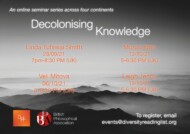
Decolonising Knowledge: An online seminar series across four continents
28 September – 19 October 2021, Online event.
Organised by Andreas Sorger and Clotilde Torregrossa
-
Expand entry
-
Programme
Linda Tuhiwai Smith: What’s left if knowledge is decolonised?28 September 2021, 7:00 pm UK time-
Expand entry
-
Abstract
My talk will pose some questions about the conceptual and practical challenges for decolonising knowledge. The question about ‘what is left?’ confronts a fear that some may hold about a decolonising knowledge agenda but it also identifies the problem of framing our understandings of decolonising approaches. My talk begins with that question.
Biography
Linda is the author of numerous ground-breaking scholarly works which focus on critical epistemology and indigeneity. Most notably, her book Decolonizing Methodologies: Research and Indigenous People (1998) traces how Western scholarly research has facilitated the racist exploitation and colonization of indigenous peoples. This book remains today a core contribution to the study of coloniality in the academy and the process of indigenising research methodologies.
Most recently, Linda was Professor of Indigenous Education and Māori Development, Pro-Vice Chancellor Māori and Dean of the School of Māori and Pacific Development as well as the founding Director for Te Kotahi Research Institute at the University of Waikato in New Zealand. She was also a founding Joint Director of New Zealand’s Māori Centre of Research Excellence from 2002-2007 and a Professor of Education at the University of Auckland.
Veli Mitova: Epistemic Decolonisation for Today’s Africa6 October 2021, 5:00 pm UK time-
Expand entry
-
Abstract
The call to decolonise knowledge is finally gaining deserved attention worldwide, in both academia and society more generally. But as the call’s popularity rises, so does scepticism about its benefits. In this talk, I develop a conception of epistemic decolonisation that is geared to withstanding such scepticism in the contemporary African context, rather than to engaging better established, more theoretical scholarship. I focus, in particular, on African philosopher Bernard Matolino’s recent paper ‘Whither Epistemic Decolonization?’. Matolino issues three challenges to the continued theorising epistemic decolonisation. First, it politicises the knowledge enterprise in an unacceptable way. Second, it seems to leave the black African forever stuck in a negative project of trying to define herself in contrast to the coloniser. Finally, dwelling on the epistemic wrongs of colonialism obscures important aspects of the African’s condition, such as her continued political and material disempowerment. If these challenges are on the right track, they threaten to derail the whole project of epistemic decolonisation. But I argue here that such pessimism is premature. I first offer a sketch of what I take epistemic decolonisation to involve. I then show how this sketch can help us defuse Matolino’s challenges.
Biography
Veli is Professor in Philosophy and Director of the African Centre for Epistemology and Philosophy of Science, at the University of Johannesburg. She is also the South African team leader for The Geography of Philosophy Project, and a PI for the Epistemic Injustice, Reasons, and Agency project funded by a Newton Advanced Fellowship.
Veli works at the intersection of epistemology, metaethics and the philosophy of action. At the moment, she is thinking about epistemic injustice and decolonising knowledge. She is the author of Believable Evidence (CUP 2017), and the editor of Epistemic Decolonisation (2020) and of The Factive Turn in Epistemology (CUP 2018).
Before joining the University of Johannesburg in 2015, Veli taught and researched at Universität Wien, Universidad Nacional Autonoma de México, Rhodes University (her alma mater), and Cambridge (where she obtained her PhD).
Murad Idris: Re-Framing Islam: Submission, Reformation, Pacification—Decolonization?13 October 2021, 5:00 pm UK time-
Expand entry
-
Abstract
The definition of Islam as submission, the claim that Islam needs a Luther, and the desire to identify jihād with private and spiritual struggle, all reflect a series of compulsions and elisions. The three idioms are fundamental to how Islam has been constituted in language as a subject and as a problem. They each also have forgotten genealogies. This project outlines these genealogies and their intersection through the politics of translating Islam as submission, peace, or salvation; of narrating its place and temporality in modernity; and of reinterpreting historical texts and exemplars through the prism of liberalism and toleration. These three moves take Islam out of history. The dislocation of Islam winds through three disciplinary moments that track political theory’s investments in philology, teleology, and philosophy. The seminar concludes by pointing toward critical possibilities and resources that emerge out of alternative discursive formations. In the process, it reflects on the implications of these genealogies for the project of decolonizing “Western thought” and “Islam”—whether as object or subject of discourse—and its limits.
Biography
Murad Idris is Associate Professor of Political Theory at the University of Michigan. Before coming to Michigan in 2021, he held positions and fellowships at Cornell University’s Department of Government, Columbia University’s Society of Fellows in the Humanities, the Institute for Advanced Study in Princeton NJ, and the University of Virginia. He received his PhD in Political Science from the University of Pennsylvania.
Murad’s work focuses on Islamic political thought, Islam in political theory, empire and postcolonialism, global intellectual history, international political theory, the politics of comparison, and disciplinary history. He’s currently working on two books: one on constructions of Islam and another on Sayyid Qutb’s international political thought.
Murad is the author of War for Peace: Genealogies of a Violent Ideal in Western and Islamic Thought (2019), which won the David Easton Award from APSA and two Best Book Awards from the ISA. He co-edited The Oxford Handbook of Comparative Political Theory (2020) with Leigh Jenco and Megan Thomas.
Leigh Jenco: Is “Decolonizing” Enough? Premodern Chinese Thought and the Challenges of Disciplinary Inclusion19 October 2021, 5:00 pm UK time-
Expand entry
-
Abstract
Recent calls to decolonize the curriculum of a variety of disciplines have rightly focused on the impact of European imperialism on what can be said and thought in the modern academy. But is this critique sufficient, even in its own terms, to fully capture the range of historically possible modes of thinking and being that should inform our contemporary politics? In this talk I argue that a more radical kind of curricular diversity is required to take account of premodern traditions of thought–to include not only those that exhibit continuity with contemporary forms of knowledge and experience, but also those that may have been marginalized and truncated by non-European practices of imperialism or forms of knowledge. I focus in particular on premodern Chinese thought, a multidisciplinary, internally self-referential intellectual ecosystem, with pervasive connections to questions of philosophy. Yet these connections are not readily visible within its corpus of texts spanning more than 2000 years, whose sheer abundance and linguistic distance from living languages inhibits easy navigation or comprehension. Being less subject to reorganization by modern European imperial power, its categories continue to animate certain forms of present-day knowledge, making its inclusion in curricula all the more urgent—even as its very breadth and complexity demand wide-ranging transformations in what we take philosophical knowledge to be. How are these challenges to be met, particularly if we recognize that this body of thought has sustained normative enquiry for centuries, in terms unrelated to more familiar commitments to freedom and justice? How, moreover, can we comprehend the exclusions this body of thought has enacted over centuries, including the subjugation of non-Han Chinese and non-textual forms of knowledge and experience?
Biography
Leigh is Professor of Political Theory at the London School of Economics’ Department of Government. Before joining the LSE in 2012, Leigh taught and researched at the Institute of Modern History, Academia Sinica, Taiwan; the Department of History, National Taiwan University; and the University of Heidelberg. She obtained her PhD from the University of Chicago.
Leigh’s scholarship is focused on Chinese political thought, Taiwan studies, global intellectual history, comparative political theory, epistemology, and metahistory. One of her current research projects focuses on articulations of otherness and equality within late Ming neo-Confucian scholars including Jiao Hong and Chen Di.
Leigh is the author of Making the Political: Founding and Action in the Political Theory of Zhang Shizhao (2010) and Changing Referents: Learning Across Space and Time in China and the West (2015). Leigh also co-edited The Oxford Handbook of Comparative Political Theory which compiles a series of articles paving the way towards establishing comparative political theory’s guiding principles and methodologies.
Patronage


-
Northern Diversity Forum Workshop
21 November 2019, Seminar Room PZA/115, Piazza Building, University of York, UK.
Organised by Anna Klieber
-
Expand entry
-
Programme
Alya Khan (London Metropolitan University): Resisting the ‘Mythical Norm’ Today. Some Thoughts for Philosophy21 November 2019, 2:00 pm UK timeAnnie McCallion (University of Manchester): About “Women in Parenthesis”21 November 2019, 3:30 pm UK timeSimon Fokt (independent): Diversity Reading List Workshop21 November 2019, 4:45 pm UK timePatronage

